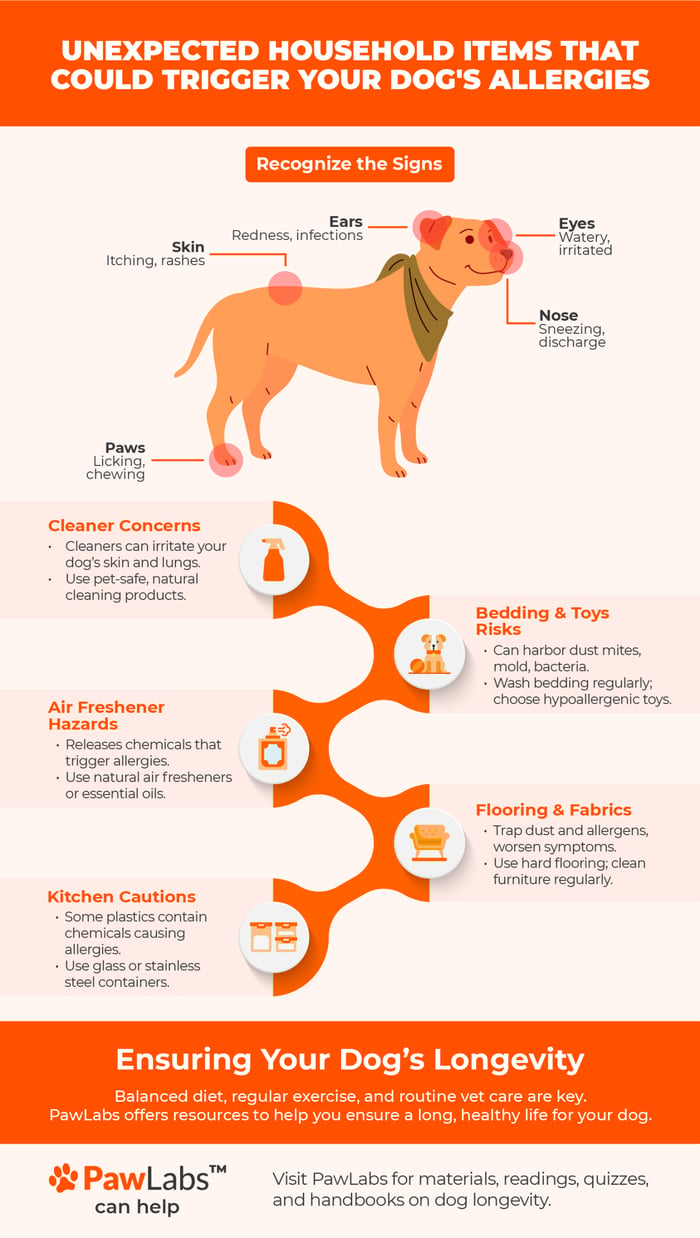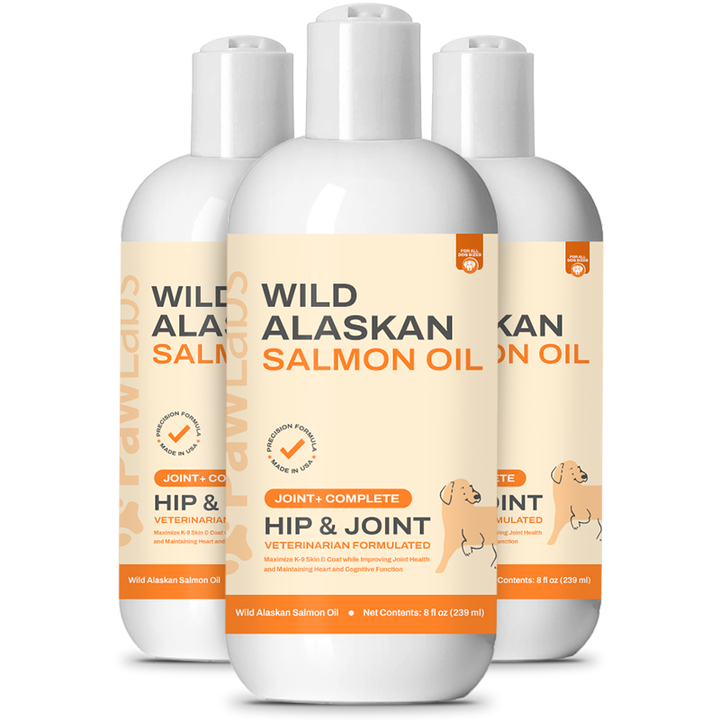Unexpected Household Items That Could Trigger Your Dog's Allergies
Everyday Items Causing Dog Allergies

Everyday Items Causing Dog Allergies
As a loving dog owner, you want to ensure your furry friend is happy and healthy. But what happens when your dog starts scratching, sneezing, or showing signs of discomfort? Dog allergies are more common than you might think, and the culprits can often be found right inside your home. In this blog, we'll explore the unexpected household items that could be triggering your dog's allergies and offer solutions to help you manage them.

What Are the Common Dog Allergy Symptoms That Pet Owners Should Watch Out For?
Recognizing the signs of allergy in your dog is the first step in providing relief. Here are some common dog allergy symptoms:
- Itching and scratching: Persistent scratching, licking, or biting at the skin.
- Red or inflamed skin: Areas of redness, swelling, or hot spots.
- Ear infections: Recurrent ear infections or a bad odor from the ears.
- Sneezing and coughing: Frequent sneezing, coughing, or nasal discharge.
- Gastrointestinal issues: Vomiting, diarrhea, or other digestive problems.
- Watery eyes: Increased tearing or discharge from the eyes.
If you notice any of these symptoms, it’s important to consult your veterinarian to determine if allergies are the cause.
How Can Everyday Household Cleaners Contribute to Dog's Allergies?

Household cleaners are essential for maintaining a clean home, but some of the chemicals in these products can be harmful to your dog. Many cleaners contain harsh chemicals that can irritate your dog’s skin and respiratory system. When your dog comes into contact with surfaces cleaned with these products, they may develop dog skin allergies or respiratory issues.
To minimize the risk, consider using pet-safe cleaning products that are free from harsh chemicals. Look for labels that indicate the product is safe for use around pets or opt for natural cleaning solutions like vinegar and baking soda.
Are There Hidden Allergens in Your Dog’s Bedding or Toys That Could Be Causing Dog Skin Allergies?

Your dog's bedding and toys can harbor allergens that contribute to the dog's allergies to skin. Dust mites, mold, and bacteria can accumulate in fabric and stuffing, causing irritation and allergic reactions. Additionally, some materials used in toys and bedding can be allergenic themselves.
To reduce the risk, wash your dog's bedding regularly in hot water and use hypoallergenic laundry detergent. Choose toys made from non-toxic, hypoallergenic materials and clean them frequently.
How Might Certain Types of Flooring and Furniture Materials Affect Dog Allergy Symptoms?
The materials used in your flooring and furniture can significantly impact your dog's allergy symptoms. Carpets, for example, can trap dust, pollen, and pet dander, creating a breeding ground for allergens. Similarly, certain fabrics on furniture can hold onto allergens and irritate your dog's skin.
Consider switching to hard flooring options like tile, hardwood, or laminate, which are easier to clean and less likely to harbor allergens. For furniture, choose materials that are easy to wipe down and keep free from dust and dander.
How Do Laundry Detergents and Fabric Softeners Contribute to Dog Skin Allergies?
The laundry detergent and fabric softeners you use can leave residues on your dog's bedding, blankets, and even your own clothes, which can then transfer to your dog's skin. These residues can cause dog allergy specifically on skin, leading to itching, redness, and discomfort.
To reduce the risk, use hypoallergenic laundry detergents and avoid fabric softeners. Additionally, rinse your laundry thoroughly to remove any lingering detergent residue.
Can Common Kitchen Items, Like Food Storage Containers, Lead to Dog Skin Allergies?

It may be surprising, but even common kitchen items like food storage containers can contribute to dog skin allergies. Plastic containers, in particular, can contain chemicals that cause allergic reactions. When your dog comes into contact with these containers, they may develop skin irritations or other allergy symptoms.
Opt for glass or stainless steel food storage containers to reduce the risk of exposure to harmful chemicals. Additionally, ensure that your dog's food and water bowls are made from non-toxic materials and clean them regularly.
What Unexpected Ingredients in Human Food Might Cause Dog's Allergies?
Certain ingredients in human food can cause dog allergies. While many pet owners enjoy sharing their meals with their furry friends, some foods can trigger allergic reactions. Common culprits include:
- Dairy products: Many dogs are lactose intolerant and can develop allergies to dairy.
- Wheat and grains: Some dogs have sensitivities to grains, leading to skin and digestive issues.
- Artificial additives: Preservatives, colorings, and flavorings in human food can cause allergic reactions in dogs.
To prevent dog allergies, stick to a balanced diet formulated for dogs and avoid giving them table scraps or foods that may contain allergens.
What Role Do Air Fresheners and Scented Candles Play in Triggering Dog Allergies?

Air fresheners and scented candles may make your home smell pleasant, but they can also release chemicals that trigger dog allergy. Many of these products contain volatile organic compounds (VOCs) that can irritate your dog's respiratory system and skin. To keep your home smelling fresh without causing harm to your dog, use natural alternatives like essential oil diffusers (ensuring the oils are safe for dogs) or simply open windows to allow fresh air to circulate.
The Importance of Dog Longevity
The ultimate goal for most dog owners is to ensure their furry friends live long, happy lives. A significant part of achieving this is providing them with a diet that not only satisfies their taste buds but also meets their nutritional needs. Paying attention to what your dog eats and how it affects their health and behavior is crucial.
Wild Alaskan Salmon Oil

Wild Alaskan Salmon Oil

$24.95
$34.95
8 ESSENTIAL KEY NUTRIENTS: Omega-3 (EPA and DHA) Omega-6 Natural Vitamin D3 Essential B Vitamins Astaxanthin Biotin Selenium Iodine … read more
 SUCCESS!
SUCCESS!






